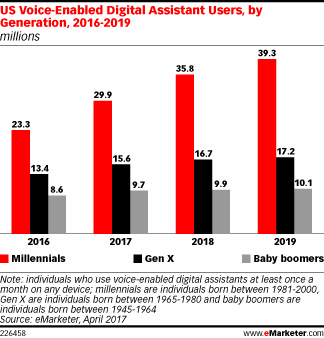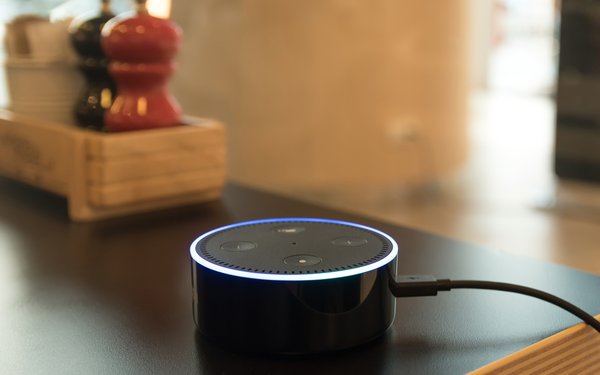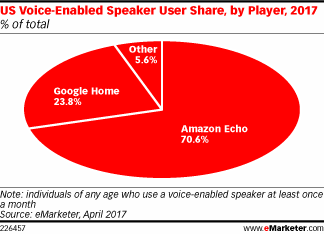Amazon controls 70% of the voice-enabled speaker device market
While still far from mass adoption, virtual assistants are becoming more widely used by Americans, according to eMarketer’s first forecast on users of digital assistants, such as Siri, and voice-enabled speakers, like Amazon Echo.
This year, 35.6 million Americans will use a voice-activated assistant device at least once a month. That’s a jump of 128.9% over last year.
Amazon’s Echo speaker will have 70.6% of users. Meanwhile, Google Home will trail far behind with just 23.8% of the market. The remaining portion will be shared among smaller players, such as Lenovo, LG, Harmon Kardon and Mattel.
eMarketer expects Amazon’s market share to fall slightly in the coming years, as Google’s share grows. But Amazon will remain the dominant player in the category for the foreseeable future.
“Consumers are becoming increasingly comfortable with the technology, which is driving engagement,” said Martín Utreras, vice president of forecasting at eMarketer. “As prices decrease and functionality increases, consumers are finding more reasons to adopt these devices.”
eMarketer defines a voice-enabled speaker as a standalone device whose core functionality is a voice-enabled digital assistant, such as Google Home or Amazon Echo.
The broader category of virtual assistants—the actual software inside various devices—is seeing growth in the number of users as well. eMarketer expects usage will grow 23.1% in 2017. This category includes Amazon’s Alexa, Apple’s Siri, Google Now and Microsoft’s Cortana.

This year, 60.5 million Americans will use Siri, Cortana or another virtual assistant at least once a month. That equates to 27.5% of smartphone users, or nearly one-fifth of the population.
The heaviest users of digital assistants are people between the ages of 25 and 34. They represent 26.3% of virtual assistant users. In terms of generation, more than one-third of millennials (33.5%) will use a virtual assistant this year.
“Older millennials are the core users of virtual assistants, mainly due to their demand for functionality over entertainment,” Utreras said.


